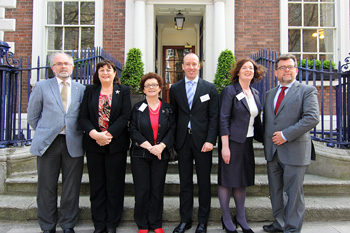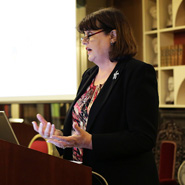Posted 10 May 2013
Commissioner calls on the humanities to play a part in innovation research
“Humanities and the social sciences have a central role to play in the innovation arena,” UCD Professor Margaret Kelleher told a gathering of academics, policy-makers, government and European research officers in Dublin.
“Important though it is for economic prosperity, STEM (science, technology, engineering and maths) cannot function in isolation from the humanities disciplines.”
Professor Kelleher was speaking at a conference organised to examine the role, contribution and significance of research and innovation in the Humanities and Social Sciences in Ireland and the European Union and to assess and reflect on the different ways in which this research is helping the process of economic recovery and sustainable development across the continent.

Pictured at the event (l-r): Professor Luke Drury President RIA;
Commissioner Maire Geoghegan-Quinn;
Professor Maeve Conrick, Principal, College of Arts and Celtic Studies;
Dr Michael Geary, Maastricht University and Woodrow
Wilson Scholar;
Professor Margaret Kelleher, Chair of Anglo-Irish Literature and Drama, UCD; and
Dr John Bell, Head of Cabinet, Commission for Research,
Innovation and Science, and UCD Graduate
The emphasis on innovation as a mechanism for improving economic prosperity has been outlined in the European Union Horizon 2020 initiative which will specifically fund research that addresses major challenges such as health, demographic change and wellbeing, food security and sustainable agriculture, energy, transport, innovative and inclusive societies, and climate action. European commissioner Máire Geoghegan-Quinn, who has responsibility for Research, Innovation and Science, spoke of about the role of humanities within Horizon 2020.
“Answers to the toughest questions cannot always be found in the laboratory. Social sciences and humanities are the key to decoding some of the most critical problems, not least in Europe.” Commissioner Máire Geoghegan-Quinn said. “Decoding is not just for DNA.”
“The world is constantly changing, and big changes force hard choices. We need the social sciences and humanities to analyze the options, situate the decisions and guide and inspire the choices.” She added.
Horizon 2020 will succeed FP7 in 2014 as the EU’s premier research and innovation programme. Running from 2014 to 2020, it has a budget of €80 billion.
Minister for Research and Innovation, Mr Sean Sherlock TD stressed the Irish Government’s commitment to research in the humanities and social sciences.
“It is well understood that the Arts, humanities and social sciences contribute to society by educating us to imagine a world different to the one in which we now find ourselves, or indeed that we have come from.” The Minister said. “This is at the heart of what is required for our renewal as a country and as a nation.”
Dr John O’Brennan, Centre for the Study of Wider Europe in NUI Maynooth, emphasised the importance of giving prominence to previously neglected aspects of the humanities and social sciences as a means of identifying alternative competences and expertise for economic and social advancement. “We have the opportunity to create social and cultural innovators who can collaborate with colleagues in the STEM area to ensure that society and citizens remain at the heart of European research priorities and who can nurture and advance our cultural creativity”, added Dr Michael Geary, Woodrow Wilson Centre Scholar and conference co-organiser.
Co-organised by NUI Maynooth, UCD and the Woodrow Wilson Centre, as part of Ireland’s EU Presidency, the conference at the Royal Irish Academy addressed the significance of research and innovation in the Humanities and Social Sciences in the process of economic recovery. Examples of AHSS (Arts, humanities and social sciences) research presented at the conference included the European Research Council-funded project ‘The Programmable City’, led by Professor Robert Kitchin (NUI Maynooth) which analyses the influence of software and technology on how we live, work and operate in cities; and UCD Professor Robert Gerwarth’s European Research Council grant in history, which explores the transnational history of failed demobilization and paramilitary violence from Ireland through Europe and across the wider world after the Russian revolution and the end of the Great War.
(Produced by UCD University Relations)

